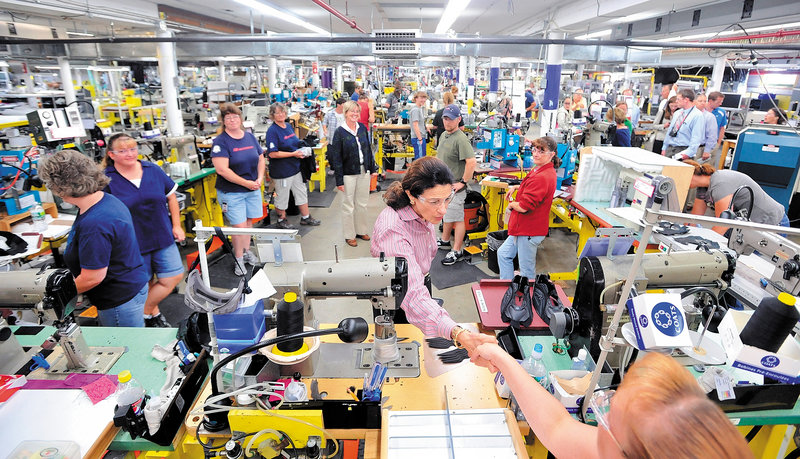A contrasting combination of pride and anxiety showed in the faces of workers last month when U.S. Sen. Olympia Snowe toured the New Balance shoe factory in Norridgewock.
The 800 Mainers who work at New Balance’s plants in Norridgewock, Skowhegan and Norway are proud still to be producing American-made athletic shoes. But they worry that New Balance isn’t immune to the economic and free trade pressures and incentives that have caused so many other athletic-shoe manufacturing jobs to leave the U.S.
Even Boston-based New Balance, which prominently stamps “Made in USA” on the shoes produced in Maine and two factories in Massachusetts, makes 75 percent of its shoes abroad, in places like China and Vietnam.
Some issues that Maine lawmakers such as the Republican Snowe and Democratic Rep. Mike Michaud, who visited New Balance’s Skowhegan factory in August, hear about when they visit New Balance plants are complex and don’t have easy answers.
A pending free trade agreement with Vietnam and other Asia-Pacific countries could boost exports of an array of U.S. goods and services, and make it easier for athletic shoes made by low-wage workers to be sold tariff-free. That would add a layer of difficulty to New Balance’s effort to keep operating plants in Maine and Massachusetts.
One problem facing New Balance would seem relatively simple to address: the U.S. Department of Defense’s decision to exclude athletic shoes from a World War II-era law, known as the Berry Amendment, mandating that American soldiers be outfitted with clothes and other gear made in America.
Instead, recruits are given cash allowances to buy athletic shoes for training and exercise, except Marines, who have to buy their own because shoes are considered “personal items.”
The Defense Department’s rationale for the cash allowances is that recruits should have the freedom to choose shoes that best suit the “uniqueness of their individual physiology, running style, and individual comfort and fit requirements.”
That was part of a Defense Department report issued earlier this year in response to lawmakers such as Sen. Susan Collins, R-Maine, a member of the Senate Armed Services Committee who worked with committee Chairman Carl Levin, D-Mich., to put language in the 2011 defense authorization bill demanding that the department explain the footwear policy.
The report, of course, drove lawmakers from New England nuts.
The job creation debate goes on, but here’s a case where the U.S. military appears to be looking for reasons not to buy products made by Americans who are at risk of losing their jobs.
Another problem: the Berry Amendment essentially mandates that every component in a product be made domestically, not just the overall product. The exception is when particular components just aren’t available domestically, such as the mid-soles for athletic shoes.
New Balance produced 5,000 pairs of Berry Amendment-compliant athletic shoes, which are in a warehouse because the military refused to budge from its stance of just giving soldiers cash allowances for sneakers. New Balance still hopes to sell them to military exchanges where soldiers can buy them if they choose.
Collins and Snowe are following up in the pending 2012 defense bill with another bid to get the military to reverse its stance: a provision requiring the Pentagon to do a market survey of how many U.S. companies would be able to produce athletic shoes to meet the military’s needs.
Michaud says he will introduce legislation this month to require the Pentagon to buy American-made athletic shoes.
New Balance says it’s not looking for a guaranteed contract with the military, and will help find other American shoe manufacturers that would be willing to retool if the Defense department put out a request for bids to buy American-made athletic shoes.
“If the military offers a procurement opportunity, others will come to the table,” such as American manufacturers of dress shoes and work boots, said Matt LeBretton, New Balance’s director of public affairs. “We have recruited other shoeware makers. A number of companies have said they are interested.”
Maine lawmakers say the issue isn’t complicated.
“There’s nothing that prevents any of the other shoe manufactures from re-basing their operations in the United States if they want to compete for this market,” Collins said. “As long as the Berry Amendment is on the books, from my perspective it ought to be complied with.”
When Michaud toured the New Balance plant in Skowhegan, he said he would write a letter to President Obama calling on the president to direct the secretary of defense to buy American athletic shoes. It’s a simple matter of holding Obama to his commitment to preserve U.S. manufacturing jobs, Michaud said.
Directing the Defense department to figure out a way to reasonably buy American-made shoes along with all the other American-made apparel it buys for soldiers probably won’t be on the list of proposals that Obama puts forward Thursday night in his joint address to Congress, or on the rebuttal list of job creation ideas that GOP leaders will crank out in response.
Perhaps it should be.
MaineToday Media Washington Bureau Chief Jonathan Riskind can be contacted at 791-6280 or at:
jriskind@mainetoday.com
Send questions/comments to the editors.



Success. Please wait for the page to reload. If the page does not reload within 5 seconds, please refresh the page.
Enter your email and password to access comments.
Hi, to comment on stories you must . This profile is in addition to your subscription and website login.
Already have a commenting profile? .
Invalid username/password.
Please check your email to confirm and complete your registration.
Only subscribers are eligible to post comments. Please subscribe or login first for digital access. Here’s why.
Use the form below to reset your password. When you've submitted your account email, we will send an email with a reset code.